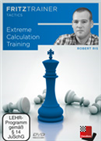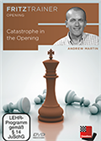“I would probably prefer to beat Magnus”
The Lindores Abbey Chess Challenge started on May 18th. Twelve players are taking part. After a three-day preliminary, the best eight players will advance to the deciding knockout section. The time control is 15 minutes for the game, with a 10-second increment per move.
Hikaru Nakamura took down Magnus Carlsen in the semis, but was not able to beat Daniil Dubov — the world champion's second — in the final. Much like Nakamura against Carlsen, Dubov came from behind to win the tournament after losing the first mini-match of the final. The Russian bagged $45,000 for his efforts, while Nakamura received an also hefty $27,000 prize as the runner-up.
The third rubber of the final saw Dubov winning game two after a draw in the first encounter. An immediate comeback by Nakamura tied the score. The five-time US champion had white in the last 15-minute game and, following his strategy of the event, played it safe instead of going all-in. Afterwards, Dubov confessed that this did not come as a surprise:
Throughout the match I had this feeling like he's absolutely sure that he will win the Armageddon with black. [...] He didn't try to play in game four; he was also slightly better in game one and decided to repeat the moves.
 Special attention will be paid to Intermediate Moves, Quiet Moves, Sacrifices on Empty Squares, Mating Patterns, Ignoring Opponents Threat, Calculation in Defence and Method of Comparison. Plus 50 interactive examples to test your knowledge.
Special attention will be paid to Intermediate Moves, Quiet Moves, Sacrifices on Empty Squares, Mating Patterns, Ignoring Opponents Threat, Calculation in Defence and Method of Comparison. Plus 50 interactive examples to test your knowledge.Of course, ‘Naka’ adhered to the plan and chose black in the sudden-death decider. An early blunder, however, left him with a lost position prematurely. Peter Svidler, in the commentary ‘booth’, found a killer shot for Dubov immediately, but the younger Russian failed to notice the opportunity. Nevertheless, he went on to convert his massive advantage into a win.
The champion was asked to rate this victory in comparison to other career triumphs and, naturally, he noted it is hard to improve on his victory at the 2018 World Rapid Championship. Incidentally, back then, he also won the event without having to face Carlsen. Dubov declared:
It's a bit weird to win a tournament with Magnus participating without beating Magnus. It always felt a bit unfair to me.
He went even further, stating that he would have preferred to be in Nakamura's shoes — i.e. to beat Carlsen but not to win the tournament:
If you'd ask me what would I prefer, to win the Lindores Abbey or to win a series of matches against Magnus, I would definitely think about it. [...] And, in terms of the way I see things, I would probably prefer to beat Magnus, to be honest.
The respect Dubov feels towards Carlsen continued popping up in the conversation. While talking about how he managed to bounce back from the loss in the first mini-match, the Russian grandmaster said:
In general, when you feel that you are quite a decent player, then you normally know that it's pretty much about yourself, unless you're playing Magnus probably. [...] If it's not Magnus, I just feel like I can basically fight all the rest.
There was a general feeling of satisfaction for Dubov's win among chess fans in social media. Of course, Nakamura's status as a blitz virtuoso has not subsided at all, but seeing a sharp and talented lower-rated player winning an important event increases the chances of him getting more invitations — certainly a welcomed prospect:
The next event of the Magnus Carlsen Tour, the Online Chess Masters, kicks off on June 20th.


Dubov 3:2 Nakamura
The first one to score a full point was Dubov. He got the bishop pair out of a Sicilian with black and went on to make good use of it in an endgame with play on both sides of the board:
 In chess, the technique of exchanging pieces is the ultimate knowledge. The biggest specialists of this were such greats as Akiba Rubinstein and Vasily Smyslov. The exchange bishop for knight is the most common case. The technique of exploiting the individual power of these pieces is completely different.
In chess, the technique of exchanging pieces is the ultimate knowledge. The biggest specialists of this were such greats as Akiba Rubinstein and Vasily Smyslov. The exchange bishop for knight is the most common case. The technique of exploiting the individual power of these pieces is completely different.
Black has the more active rook and the possibility to both attack White's weaknesses on the kingside and potentially come back in time to the queenside if a pawn race emerges — a good example of the superiority of the bishop pair under the right circumstances. The game continued 40...Bh5 41.a5 Bxf3 42.Rf1 Rf4 43.a6 Bd4 and after the blunder 44.Re1 White cannot avoid losing a piece: 44...Re4 and Nakamura resigned.
Nakamura bounced back immediately, also winning with black by getting the better of his opponent in a queenless position. A 39-move draw that never quite took off led to Armageddon. A 5-minute game would decide the winner of the competition. However, early into the much-anticipated sudden-death encounter, it seemed all but impossible for Dubov not to get the victory:
 ‘Catastrophe in the Opening’ is a study of how the games of contemporary players go awry the initial stages of the game and as such, will prove instructive at all levels. It’s designed to help you avoid disaster in your own games.
‘Catastrophe in the Opening’ is a study of how the games of contemporary players go awry the initial stages of the game and as such, will prove instructive at all levels. It’s designed to help you avoid disaster in your own games.
Black's 12...Bxd5 (instead of 12...fxg3+) pretty much put an end to the game. Now White has 13.Nxf4, and after 13...Ne7 Svidler found the clear-cut 14.Nfxd5 Nxd5 15.Qh5, winning a piece by force. Dubov went for an immediate 14.Qh5, which is also clearly winning, and claimed the win after Nakamura sacrificed a queen and failed to find a way to trick his younger opponent.
Select an entry from the list to switch between games
Links
























